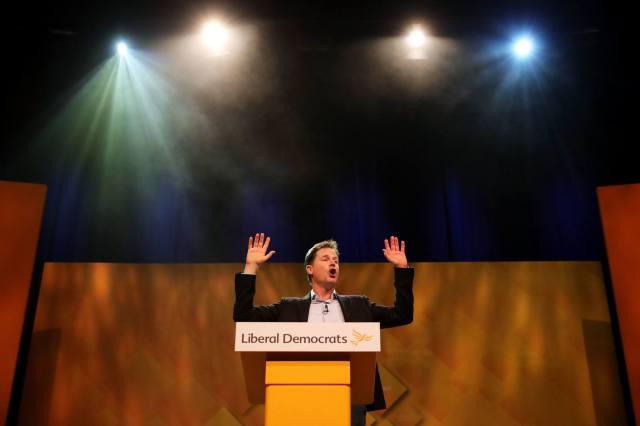Credit: Christopher Furlong/Getty Images

What’s your second favourite planet? Not a question you may have given much thought to, but give it a go. Is it perhaps Saturn with its spectacular rings? Or how about Mars, our potential home-from-home?
Mine is Jupiter, because life on Earth would be unimaginable without it. This requires some explanation.
Jove is a big lad, more than twice as heavy as all the other planets put together. The consequent gravitational pull sweeps the solar system free of detritus that might otherwise collide with the inner planets – including our own. Lumps of rock that could wipe out human civilisation are instead sucked harmlessly into Jupiter’s thick atmosphere.
A few years ago, I wrote that Britain’s Liberal Democrats used perform the same function – not in saving the world, of course, but by preserving the political status quo. A party that promised to ‘break the mould’ of British politics in fact stabilised it by sweeping up protest votes before they could do any harm to the political establishment. Under a first-past-the-post electoral system (which allows a third party to get lots of votes, but few seats and even less political power) this worked very well.
But then it all went wrong. In 2010, the party accidentally won too many seats and found itself in coalition with the Conservatives – the rest is history and so are the Lib Dems.
That said, the survivors gamely stagger on – and some commentators are good enough to notice. One of them is Rafael Behr of the Guardian. His piece on the party’s annual conference (which was this week, by the way) gives him an opportunity to diagnose the confusion at the heart of Lib Demmery and, much more importantly, liberalism in general:
“To project the tumultuous events of recent years through a Lib Dem lens flatters the party’s significance, but it illuminates a problem for a wider tribe that feels politically adrift right now. They see the collapse of the liberal centre as a moral calamity: the ascendency of foul populism. But to insurgent forces of left and right, the centrist lament is just the nostalgia of a deposed, discredited elite. Liberals themselves don’t seem sure whether their business is restoration of the old order or rebellion against a new one.”
I’d go much further and say this was always the Lib Dem problem – a party that presented itself as the party of change was in fact an agent of the status quo. Gaining a share of power in 2010 not only exposed that contradiction, it did so at a time when the popular demand for change had become more urgent and real than at any point for decades.
Behr asks whether the Lib Dems’ sorry state says “anything meaningful about the state of liberalism itself?”
The answer is “yes” in that liberals still imagine themselves to be the outsiders and subversives they started off as, but haven’t been for a very long time. In almost any sphere one can mention – politics, business, finance, public services, culture – liberals of various kinds have been running the show for decades. Denying this fact is a bizarre inversion of impostor syndrome – instead of people who falsely believe that they don’t deserve the position they’re in; liberals falsely believe that they’re not in the position they definitely do think they deserve.
If voters are now turning to genuine anti-establishment parties, whether of the illiberal Left or Right, it is because the establishment has screwed up so lavishly. The financial crash, the Great Recession, a decade of austerity, the immigration crisis, the housing crisis, the housing crisis, re-proletarianisation of the working class, the Eurozone crisis, the immiseration of Greece, banker bailouts, growing inequality, creeping technopoly, the collapse of family and social institutions in flyover communities. These are the actual “moral calamities” of our time.
If liberals want to have any role in the recovery they need to admit that they were the ones in charge, they were the ones responsible.
Whether in Britain or elsewhere, the supposedly ‘social democratic’ and ‘conservative’ parties are merely the centre-left and centre-right wings of liberalism. The existence of ‘purist’ liberal parties like the Liberal Democrats should not disguise this reality – as if liberalism were something apart from the parties of power.
Behr writes that Nick Clegg, a former Lib Dem leader and former Deputy PM, “saw liberalism as his party’s unique heritage and a quality the Labour and Tories were equally prone to neglect.”
Er, no. Tony Blair and Gordon Brown; David Cameron and Theresa May; and their equivalents in other countries: These are your people, Mr Clegg – economic and social liberals, one and all.










Join the discussion
Join like minded readers that support our journalism by becoming a paid subscriber
To join the discussion in the comments, become a paid subscriber.
Join like minded readers that support our journalism, read unlimited articles and enjoy other subscriber-only benefits.
Subscribe